[ad_1]
Description: In this article, we will discuss the importance of budgeting in affording necessary expenses. We will explore how having a budget in place can help you manage your finances effectively and avoid overspending. By understanding the cost of change and the impact it can have on your financial well-being, you can make better decisions when it comes to your expenses.
How can budgeting help you afford necessary expenses?
Budgeting is the process of creating a plan for your money, outlining how much you will spend and save each month. By setting a budget, you can track your expenses and ensure that you have enough funds to cover necessary expenses such as rent, utilities, groceries, and medical bills. Having a budget in place allows you to prioritize your spending and allocate resources effectively.
One of the key benefits of budgeting is that it helps you avoid overspending and accumulating debt. By tracking your expenses and income, you can identify areas where you may be spending more than necessary and make adjustments accordingly. This can help you save money and build a financial cushion for unexpected expenses.
Additionally, budgeting can help you set financial goals and work towards achieving them. Whether your goal is to save for a vacation, buy a car, or build an emergency fund, having a budget in place can help you stay on track and make progress towards your objectives. By being intentional about how you allocate your money, you can make better decisions that align with your long-term financial aspirations.
Ultimately, budgeting can provide you with a sense of control and empowerment over your finances. By taking charge of your money and making informed decisions, you can alleviate financial stress and secure your financial future.
Conclusion
In conclusion, budgeting is a powerful tool that can help you afford necessary expenses and achieve your financial goals. By creating a budget and sticking to it, you can track your expenses, avoid overspending, and build a strong financial foundation. Budgeting allows you to take control of your finances and make informed decisions that align with your priorities. Remember, it’s never too late to start budgeting – the sooner you begin, the sooner you can start reaping the benefits of financial stability and peace of mind.
FAQs
1. How often should I review my budget?
It is recommended to review your budget regularly, ideally on a monthly basis. This allows you to track your expenses, adjust your spending habits, and ensure that you are staying on track with your financial goals.
2. Can budgeting help me save money?
Yes, budgeting can help you save money by identifying areas where you may be overspending and making adjustments to your spending habits. By creating a budget and sticking to it, you can set aside funds for savings and build a financial cushion for the future.
3. What should I do if I have unexpected expenses?
If you encounter unexpected expenses, such as a medical bill or car repair, you can adjust your budget to accommodate these costs. Consider reallocating funds from non-essential categories or tapping into your emergency savings to cover the expenses without derailing your overall financial plan.
4. How can I stay motivated to stick to my budget?
To stay motivated to stick to your budget, remind yourself of your financial goals and the benefits of budgeting, such as financial security and peace of mind. Celebrate your progress and accomplishments along the way, and seek support from friends or family members who can encourage and hold you accountable.
5. What are the common mistakes to avoid when budgeting?
Common mistakes to avoid when budgeting include underestimating expenses, failing to track spending, not prioritizing savings, and neglecting to adjust your budget as needed. By being mindful of these pitfalls and staying disciplined in your budgeting efforts, you can increase your chances of financial success.
[ad_2]





